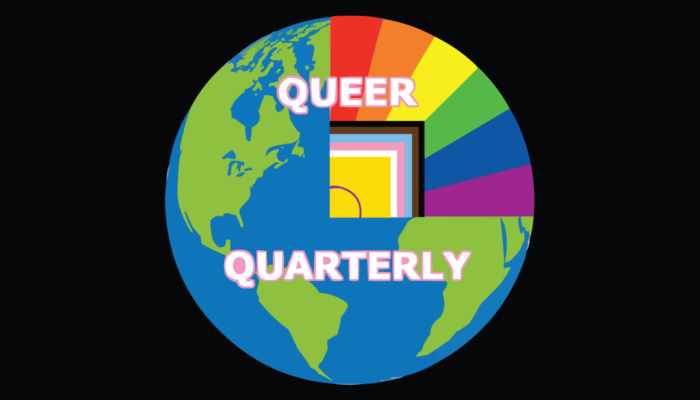
Queer Quarterly is the blog series of the EGU pride group, a LGBTQIA+ team of geoscientists engaged to uphold and improve the rights of the community in the EGU organization. This week’s post is dedicated to allyship: how people outside of the community can support our efforts.
The term LGBTQIA+ is the abbreviation for Lesbian, Gay, Bisexual, Transgender, Queer, Intersex, and Asexual. The additional “+” stands for all of the other identities not encompassed in the short acronym. An umbrella term that is often used to refer to the community as a whole (1).
Motivation
The LGBTQIA+ community faces oppression all around the world. Even in the most progressive countries, aggressions are on the rise. Loving who we love, being who we are is still illegal in many countries in 2024 (eg. marriage and adoption equality does not exist in all European countries) (2). Our rights are not guaranteed, we have to fight against conversion therapy, intersex mutilation, discrimination, transphobia, we have to advocate for safe and free access to hormones and trans surgery, free adoption, etc. In 2023 about 9% of the global population identifies as LGBT+ (3), which is a significant proportion. The reality though is that being LGBT+ is not a choice, it is simply what it is. The LGBT+ community is working on all those axes with the politics, medical, but also to normalise it in the society. The diversity of our community is our strength, and that includes the allies that you can be.
Allyship
Allyship is an important part of every minority. Being an ally means that you support the discriminated minority, encourage its inclusion and work toward the end of oppression by supporting and advocating for their actions, without yourself being part of this minority (1). The role of the allies especially in the queer community is important to support the work of the whole community and it starts very close to you in your family, friends and work cell.
A first part is to educate yourself (many resources in this article and in the links below). You need to have an idea of the difficulties, the challenges of the minority and the current state of society about it and cis/straight privilege.
Then spread this education, tolerance and respect towards the LGBT+ community. It can be very practical:
- correcting someone if they misgender a trans person, even if this person is not present,
- using a neutral word to talk about your colleagues/friends’ partners (so as not to assume they are straight),
- displaying your pronouns in the workplace (e.g. in your email signature)…
The next level of allyship is to act as a spokesperson, if you’re in a relevant position, to amplify and spread the message and actions of the LGBT+ community, especially at an institutional level. You are of course very welcome to attend events such as Gay Pride or get involved in LGBT+ associations, every voice counts. You are also very welcome to join the EGU Pride group, you can follow our actions in the EDI events at the EGU congress, or join the discord.
Diversity and safety
The safety of people is a very important issue in the LGBTQIA+ community, as we have to deal with a lot of aggression. Consider someone’s coming out as a sign of trust, make sure you ask them in what context/to whom they are out and be careful not to out anyone accidentally. They might say “yes, everyone knows I’m bi” and then you don’t have to worry, but be careful not to put anyone in danger. For the same reason, you can ask your trans friend in what context you can use their name and pronouns, especially if their passing is not binary. Talking about someone coming out, you have to remember that person has done a lot of thinking to identify their queerness, so never express doubt, it is not your business to decide which box fits them. The LGBTQIA+ community is very diverse with many different life trajectories (eg. early/late coming out, families, many various sexual/romantic orientations and in evolution, different ways of thinking about one’s own gender etc.) and we are so lucky to have them all. All need to be supported.
The diversity of the LGBTQIA+ community overlaps with that of other minorities. For this reason, our fights have a broad impact and move society towards greater inclusion.
We wish you a happy December vacation, take care!
This post is meant to be educational, feel free to share it widely.
🏳️🌈 Rainbowly yours, the Queer Quarterly editing team.
🎉✨🎉✨🎉✨🎉✨🎉✨🎉✨🎉✨
Message to the Queer Community
The time of the New Year is approaching, we know how difficult it can be for some people, take care of yourself, stay safe and we express to you our greater support.
Resources
(1) Glossary of the LGBTQIA+ Resource Center of UC Davis, California. https://lgbtqia.ucdavis.edu/educated/glossary
(2) ILGA World: Lucas Ramon Mendos and Dhia Rezki Rohaizad, Laws On Us: A Global Overview of Legal Progress and Backtracking on Sexual Orientation, Gender Identity, Gender Expression, and Sex Characteristics, 1st edition (Geneva: ILGA, May 2024) https://ilga.org/laws-on-us-report/
(3) A 30-Country Ipsos Global Advisor Survey, LGBT+ pride 2023 https://www.ipsos.com/en/pride-month-2023-9-of-adults-identify-as-lgbt
Ulrich, R.N. Queer geoscientists need more than visibility. Nat Rev Earth Environ 2, 456–457 (2021). https://doi.org/10.1038/s43017-021-00188-2
Report: “Exploring the workplace for LGBT+ physical scientists”, Institute of Physics, Royal Astronomical Society and Royal Society of Chemistry (2019). https://www.rsc.org/policy-evidence-campaigns/inclusion-diversity/surveys-reports-campaigns/lgbt-report/
Violence against trans people report https://tgeu.org/will-the-cycle-of-violence-ever-end-tgeus-trans-murder-monitoring-project-crosses-5000-cases/
Explanation of the progress pride flag https://www.lgbtqnation.com/2022/06/progress-pride-flag/



